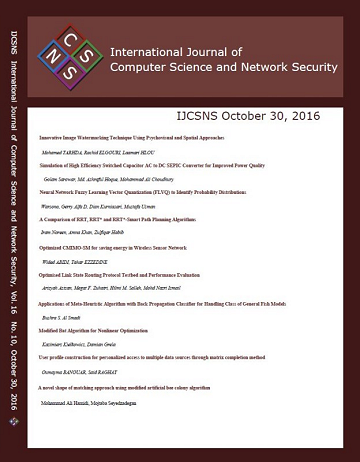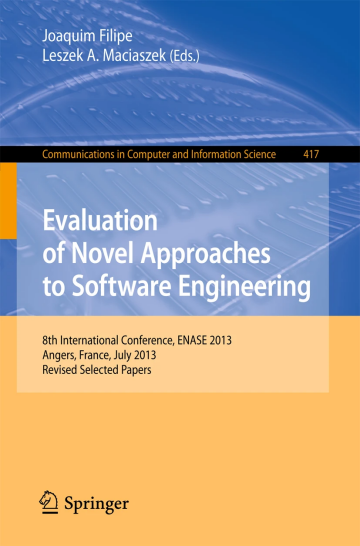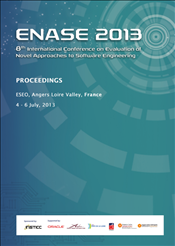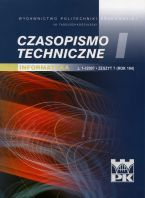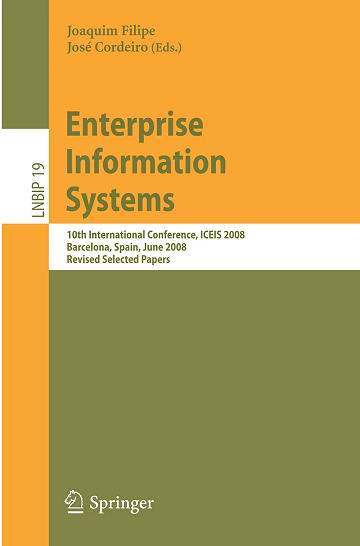Publikacje
A.Grela, J.Pamuła, K.Łach, I.Godyń, D.Malina, D.Grela,
Activated carbon and diatomite as filtration materials for nutrient removal from stormwater, Materials, 2025, vol. 18, nr 20, s.1-22.
DOI:10.3390/ma18204742

Activated carbon used as one of the layers of a rain garden may be a promising solution for removing nutrients (nitrogen and phosphorus compounds) from stormwater runoff. Progressive urbanization degrades the quality of stormwater that reaches water collectors. Rain gardens are a potential solution—nature-based systems that retain, infiltrate, and purify stormwater. The aim of this study was to evaluate the effectiveness of a model rain garden in the form of retention columns, depending on the composition of the filling material and the conditions of the simulation. The base column was filled with sand, gravel, and dolomite. The next two columns were enriched with diatomite, in a weight ratio to sand of 1:4 and 1:2, respectively. The experiment was based on four scenarios: (1) 30 min of heavy rain, (2) 2 h of rain after a drought, (3) during standard operation, and (4) with modification of the filtration material. This modification consisted of a uniform addition of granular activated carbon (GAC), which was intended to influence the column performance. The characteristics of the activated carbon were determined using XRD, SEM-EDS, and BET analysis. Pollutant concentrations were determined using a spectrophotometer and ion-selective electrodes. The analyses confirm the significant impact of the column filling materials on the efficiency of nutrient removal from stormwater, achieving even complete removal of phosphate ions, while nitrate ions were removed at a level of almost 40% and ammonium ions at >90%.
W.Wiecheć, M.Jankowski, D.Grela, Review of continuous water quality monitoring possibilities in rain gardens, EUIndTech2025: Industrial technologies and materials for sustainable Europe : 9th edition of the conference “Innovative ideas of young scientists: Science – Start-up – Industry, 2025, Kraków, Instytut Gospodarki Surowcami Mineralnymi i Energią Polskiej Akademii Nauk, s.25-25, ISBN 978-83-67606-68-4

Rain gardens are specially designed areas that support rainwater management by, among other things, preventing excessive runoff or improving water retention in the environment. Their main purpose is to collect rainwater, slow down its runoff and allow it to be gradually absorbed by the soil. Such gardens usually consist of a layer of flood-resistant plants and a specially prepared substrate to ensure proper water flow and allow rainwater collection, treatment and infiltration. Rain gardens are an element of sustainability that supports environmental protection and can also be used in urban spaces to improve water quality and manage rainwater.
The aim of the review was to determine whether and to what extent continuous monitoring of water quantity and quality in rain gardens is possible. Continuous monitoring of rainwater is based on verifying the level of water retention by a rain garden, considering the amount of rainwater flowing into such a garden, and the systematic measurement of various rainwater parameters, e.g. pollutant levels (nutrients – e.g. nitrates, phosphates), pH, temperature, turbidity, specific conductivity, dissolved oxygen concentration. To perform such monitoring, an appropriate measurement infrastructure as well as procedures and tools (both hardware and software) for data collection, analysis and interpretation are required. The review was based on industry scientific publications and the approaches proposed in the review were compared to commonly available and affordable measurement equipment (commercially available sensors, measurement accuracy and frequency, applicability to rain gardens). The results were presented in the form of a tabular overview according to the adopted criteria concerning: accuracy and resolution of measurements taken, disadvantages, advantages, method of data transmission and collection, limitations and price. The aim of the review was to analyse the measurement methods and measurement devices used today with a perspective of applying them to the rain garden being built as part of a co-operative student project.
The results obtained can help in the further development of the rain garden concept by allowing more effective control of rainwater pollution levels and their removal, which can positively affect the introduction of more sustainable rainwater management practices. In addition, the process of constructing a continuous monitoring system itself also provides information on what equipment, in what configuration, can be used so that water quality and retention measurements can be carried out at the lowest possible cost, while still being fully effective.
This work was funded by the project “Retention, infiltration and purification of rainwater” within the FutureLab PK.
I.Godyń, A.Grela, D.Grela, K.Łach, D.Malina, J.Pamuła, Diatomite as a filtration material for the removal of nutrients from stormwater, EUIndTech2025: Industrial technologies and materials for sustainable Europe : 9th edition of the conference “Innovative ideas of young scientists: Science – Start-up – Industry, 2025, Kraków, Instytut Gospodarki Surowcami Mineralnymi i Energią Polskiej Akademii Nauk, s.25-25, ISBN 978-83-67606-68-4

Progressive urbanization leads to increasing environmental pressures, including the deterioration of stormwater quality entering receiving bodies. Nature-based solutions, such as rain gardens, are being increasingly employed to improve stormwater retention and purification.
This study evaluated the effectiveness of diatomite – a naturally occurring mineral material – as an additive to rain garden substrate in the context of nutrient pollutant removal. Diatomite is a raw material sourced from the only Polish diatomite mine in Jawornik Ruski in the Subcarpathian region, which reduces the transport footprint and enables regional use of the resource.
Laboratory tests were carried out using three retention columns: one without diatomite and two with mixtures of diatomite and sand at weight ratios of 1:4 and 1:2. A simulated rainfall of 32 mm was applied, along with known concentrations of NO3-, NH4+, and PO43- at 15 mg L–1, 5 mg L–1, and 2 mg L–1, respectively.
The presence of diatomite significantly enhanced the removal efficiency of nitrogen load (expressed as the sum of N-NO3- and N-NH4-) from 9% to 44%, and phosphorus load in the form of orthophosphates from 38% to 96%. The results confirm that diatomite can be an accessible and environmentally friendly component in modern stormwater management systems, supporting local efforts to protect water resources.
I.Godyń, A.Grela, D.Grela, K.Łach, D.Malina, J.Pamuła, Diatomit jako sorbent wybranych zanieczyszczeń biogennych w ogrodach deszczowych, I Ogólnopolska Konferencja Naukowo-Techniczna WODA-ZIELEŃ-MIASTO: temat wiodący – Infrastruktura niebiesko-zielona w miejskiej praktyce rozwojowej, 2025, Politechnika Krakowska im. Tadeusza Kościuszki, s.4-4, ISBN 978-83-955526-8-7
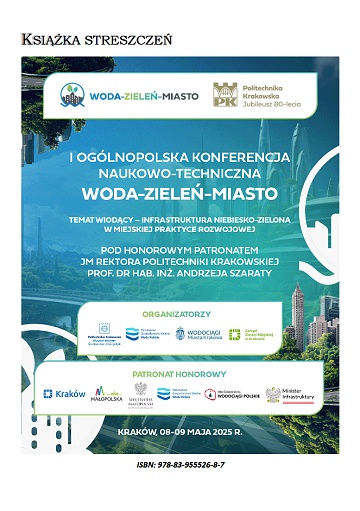
W wodach opadowych odprowadzanych do rzek znajduje się wiele zanieczyszczeń szkodliwych dla
ekosystemów wodnych, takich jak związki biogenne, metale ciężkie, substancje ropopochodne czy węglowodory aromatyczne. Zastosowanie rozwiązań opartych na błękitno-zielonej infrastrukturze pozwala zarówno na zmniejszenie ilości, jak i poprawę jakości spływów powierzchniowych. Jednym z powszechnie zalecanych sposobów zagospodarowania wody deszczowej są ogrody deszczowe. Celem badań była analiza wpływu wzbogacenia podłoża stosowanego w ogrodzie deszczowym diatomitem na efektywność usuwania zanieczyszczeń biogennych. Eksperymenty przeprowadzono w warunkach laboratoryjnych wykorzystując kolumny retencyjne: jedną kontrolną (bez dodatku diatomitu) oraz dwie doświadczalne, w których zmieszano diatomit i piasek w stosunku wagowym 1:4 oraz 1:2. Dla każdej kolumny przeprowadzono 3 eksperymenty – symulacje pracy ogrodu deszczowego podczas opadu o częstości występowania c=10 lat trwającego 30 min (wysokość opadu 32 mm), przy założonych parametrach jakościowych NO3-= 15,0 mg L-1, NH4+ = 5,0 mg L-1, PO43- = 2 mg L-1. Monitorowano objętość i jakość odpływów z kolumn po 10, 20, 30 i 40 minutach od momentu rozpoczęcia eksperymentu. Dodatek diatomitu w ilości 20% poprawił skuteczność usuwania azotu z 9% (w kolumnie kontrolnej) do ok. 40%, a dalsze zwiększenie dodatku diatomitu (do 30% wagowo) pozwoliło osiągnąć skuteczność ok. 44%. Usuwanie fosforu w kolumnach z diatomitem wynosiło średnio 96% i było niemal 2.5 krotnie wyższe niż w kolumnie kontrolnej (38%). Przeprowadzone badania potwierdzają skuteczność usuwania zanieczyszczeń za pomocą diatomitu, co pozwala na ograniczenie przedostawania się zanieczyszczeń do środowiska wodnego.
A.Grela, J.Pamuła, K.Baran-Gurgul, I.Godyń, P.Biały, M.Oramus, D.Grela, Krytyczne spojrzenie na nowe metody monitoringu jakości wód powierzchniowych, Woda : kluczowy czynnik rozwoju cywilizacji : Konferencja Naukowo-Techniczna, Kraków, 18-20 września 2024 : książka abstraktów, 2024, Kraków, Uniwersytet Jagielloński w Krakowie, s.82-83, ISBN 978-83-64089-95-4
A.Grela, K.Baran-Gurgul, J.Pamuła, I.Godyń, P.Biały, D.Grela, M.Oramus,
Analiza doświadczeń z pilotażowego monitoringu partycypacyjnego na Wiśle w Krakowie, Gospodarka Wodna, 2024, vol. 84, nr 12 (912), s.22-28.
DOI:10.15199/22.2024.12.4
Monitoring ciągły w Polsce od kilku lat realizowany jest w 35 przekrojach na Odrze (od 2023 r.) oraz 3 przekrojach na Wiśle (od 2024 r.). T-Mobile Polska, we współpracy ze stowarzyszeniem Lepszy Kraków i firmą cortineq, przeprowadziła pomiary jakości wody przy stopniu wodnym Dąbie na Wiśle w Krakowie, wykorzystując specjalistyczną boję pomiarową. Monitoring objął w sposób ciągły śledzenie pięciu wskaźników jakości wody. Analiza wyników pomiarów uwzględnia zmienność obserwowanych wskaźników oraz badanie zależności między nimi.
A.Grela, M.Łach, J.Pamuła, K.Łach, I.Godyń, D.Malina, Z.Wzorek, K.Setlak, D.Grela,
Effect of Diatomite Application on the Removal of Biogenic Pollutants in Rain Gardens, Materials, 2024, vol. 17, nr 24, s.1-26.
DOI:10.3390/ma17246279
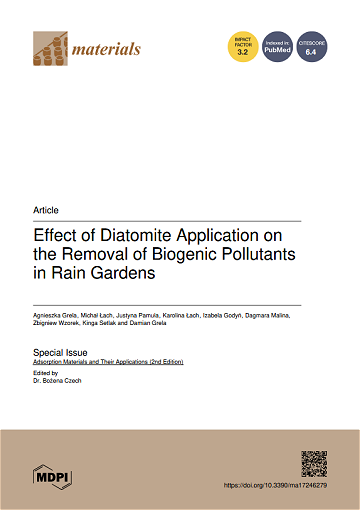
Due to its structure and properties, diatomite from a deposit in Jawornik Ruski (Subcarpathian Voivodeship) can be used as a sorbent in rain gardens. The purpose of the current research is to analyze how enriching the substrate used in a rain garden with diatomite can affect the removal of biogenic pollutants. This study was carried out under laboratory conditions using retention columns, two experimental columns with different contents of diatomite, and a control column without the addition of diatomite. Analyses of the materials used included studies of the characteristics of the rain garden layers (water permeability and granulometric analysis) and characterization of the diatomite (SEM images, oxide and phase composition, leachability, and BET). The effects of diatomite on pollutant removal were studied for NH4+, PO43−, NO3−. The results showed approximately 3-fold higher reductions in the concentration of NH4+ and PO43− in the columns with the addition of diatomite than in the control one (reduction in the concentration of NH4+ by 93 and 94% and of PO43− by 94 and 98% with the addition of 20 and 30% diatomite contents, respectively). The study results confirmed the possibility of removing contaminants using diatomite, thus reducing their entry into the aquatic environment.
K.Kiełkowicz, D.Grela,
FLC control for tuning exploration phase in bio-inspired metaheuristic, International Conference On Computer Science - Research and Applications (IBIZA 2017), Annales UMCS - Informatica, Sectio AI, Volume 16, Number 2/2016, s.32-38,
DOI:10.17951/AI.2016.16.2.32
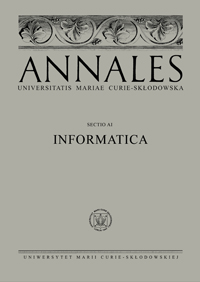
Growing popularity of the Bat Algorithm has encouraged researchers to focus their work on its further improvements. Most work has been done within the area of hybridization of Bat Algorithm with other metaheuristics or local search methods. Unfortunately, most of these modifications not only improves the quality of obtained solutions, but also increases the number of control parameters that are needed to be set in order to obtain solutions of expected quality. This makes such solutions quite impractical. What more, there is no clear indication what these parameters do in term of a search process. In this paper authors are trying to incorporate Mamdani type Fuzzy Logic Controller (FLC) to tackle some of these mentioned shortcomings by using the FLC to control the exploration phase of a bio-inspired metaheuristic. FLC also allows us to incorporate expert knowledge about the problem at hand and define expected behaviors of system – here process of searching in multidimensional search space by modeling the process of bats hunting for their prey.
K.Kiełkowicz, D.Grela, Modified Bat Algorithm for Nonlinear Optimization, International Journal of Computer Science and Network Security (IJCSNS), Volume 16, Number 10, 2016, pp.46-50
Bat Algorithm is recently proposed bio-inspired metaheuristics method for solving hard optimization tasks. It mimics behavior of bats hunting for their prey. The paper introduces some modification to Bat Algorithm. Presented modification changes exploration process as well as introduce different scheme of acceptance of a newly founded solutions. Effects of introduced modifications are tested on standard benchmark functions. The influence of a number of bats used in optimization process is also taken into account.
D.Grela, K.Sapiecha, J.Strug,
A Fault Injection Based Approach to Assessment of Quality of Test Sets for BPEL Processes, Evaluation of Novel Approaches to Software Engineering
Communications in Computer and Information Science, Volume 417, Springer, 2013, s.81-93, ISBN 978-3-642-54092-9.
DOI:10.1007/978-3-642-54092-9_6
Mutation testing is an effective technique for assessing a quality of test sets for software systems, but it suffers from high computational costs of generating and executing a large number of mutants. In the domain of BPEL processes each mutant needs to be deployed before it can be executed, thus the cost of processing mutants increases further. In contrast to mutation testing, fault injection is able to inject faults directly into the original process what reduces the redeployment requirement. The paper presents an experiment of the application of software fault injection to assess quality of test sets for BPEL processes. Faults are introduced by a Software Fault Injector for BPEL Processes (SFIBP). SFIBP simulates effects of the faults by modifying invocations of web-services and their internal variables. The experiment proved high superiority of the application of the SFIBP over the mutation testing, especially in the case of time requirements.
D.Grela, K.Sapiecha, J.Strug, An application of software fault injection for assessment of quality of test sets for business processes orchestrating web-services, Proceedings of the 8th International Conference On Evaluation of Novel Approaches to Software Engineering (ENASE 2013), pp.56-62
The paper presents an experiment of the application of software fault injection to assess quality of test sets for business processes orchestrating web-services. The mutation testing, usually used to this end, suffers from high computational costs of generating and running mutants. In contrast to mutation testing, faults injection can be performed at a run-time. Run-time changes are introduced by a Software Fault Injector for BPEL Processes (SFIBP). SFIBP is implemented as a special service that manipulates invocations of web-services and values of their internal variables. As for time requirements, the experiment proved high superiority of the application of the SFIBP over the mutation testing.
D.Grela, K.Sapiecha, J.Strug, How validation can help in testing business processes orchestrating web services, International Conference On Computer Science - Research and Applications (IBIZA 2012), Annales UMCS - Informatica, Volume 13, Number 1/2013, pp.23-35
Validation and testing are important in developing correct and fault free SOA-based systems. BPEL is a high level language that makes it possible to implement business processes as an orchestration of web services. In general, the testing requires much more test scenarios than the validation. However, in the case of BPEL processes, which have very simple and well structured implementation, test scenarios limited to the validation may also be efficient. The paper describes an experiment that aims at answering a question whether or not the validation test scenarios are also adequate for testing an implementation of BPEL processes. The experiment employs a Software Fault Injector for BPEL Processes that is able to inject faults when the test scenarios are running. The results of the experiment seem very promising. Hence, it seems that validation tests might give a strong support for testing.
D.Grela, K.Sapiecha, Error Injector for business processes orchestrated with the help of BPEL, International Conference On Computer Science - Research and Applications (IBIZA 2009), 2009
K.Sapiecha, D.Grela, Wyznaczanie scenariuszy testowych dla pewnej klasy procesów definiowanych za pomocą języka BPEL, Czasopismo Techniczne, z. 1-I/2008, ISSN 0011-4561, ISSN 1897-631X
Celem pracy jest adaptacja metody ścieżki krytycznej do procesów definiowanych w języku BPEL. W artykule pokazano, iż po spełnieniu kilku założeń proces BPELa możne być postrzegany jako system zamknięty, w którym komunikacja pomiędzy zadaniami odbywa się za pomocą i przy udziale koordynatora (aranżera) działającego zgodnie z grafem zadań systemu, a zadania odpowiadają funkcjom koordynatora.
K.Sapiecha, D.Grela, Automating test case generation for requirements specification for processes orchestrating web services, 10th International Conference on Enterprise Information Systems (ICEIS 2008), Barcelona, Spain, Information Systems Analysis and Specification vol.1/2008, pp.381-384
The research concerns generation of test cases for processes defined in BPEL. In the paper it is showed that under some assumptions BPEL process may be considered as an embedded system in which tasks are like services and communication between tasks is like coordination of the services according to task graph of the system. Following this analogy a new method for automating test case generation for requirements specification for processes defined in BPEL is given. An example illustrating the method is presented.
K.Sapiecha, D.Grela, Test scenarios generation for a class of processes defined in the BPEL language, International Conference On Computer Science - Research and Applications (IBIZA 2008), Annales UMCS - Informatica, Volume 8, Number 2/2008, pp.77-89
The main purpose of this research is an adaptation of critical paths method to processes defined in BPEL. Critical path method is specification based and simulation oriented method. In the paper it is showed that under some assumptions BPEL process may be considered as an embedded system, in which tasks are like services and communication between tasks is like coordination of the services according to task graph of the system. An example is given where a set of test scenarios is presented.






